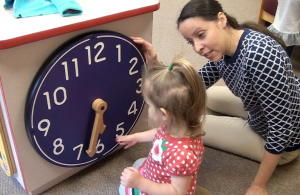
You may start to see real-life events play out through your child’s symbolic play. Symbolic play, also called pretend play or imaginative play is becoming more and more typical for your toddler right now as she plays house, doctor, farmer, and mom to her baby dolls. You may notice your toddler talking on the “phone” which is a block while you are talking on your phone. You may see him “cooking” with plastic cups and bowls in the bathtub. By doing this, your toddler is using their existing knowledge about how the world works to dictate his play. The parts of the brain that formulate memories are responsible for these symbolic play behaviors. Toddlers are using memory and recall to add to new play and discovery, then making new memories and new connections in their developing brains. Play is so critical for new learning.
Allow your toddler tons of opportunity for play! Play with your child to add new language and ideas for play.
References:
Pellegrini, A. D., Dupuis, D., & Smith, P. K. (2007). Play in evolution and development. Developmental Review, 27(2), 261–276.
Hirsh-Pasek, K., & Golinkoff, R. M. (2003). Einstein never used flashcards: How our children really learn and why they need to play more and memorize less. Emmaus, PA: Rodale Press.
Hirsh-Pasek, K., & Golinkoff, R. M. (2016). Becoming brilliant: What science tells us about raising successful children. Washington, DC: American Psychological Association.

